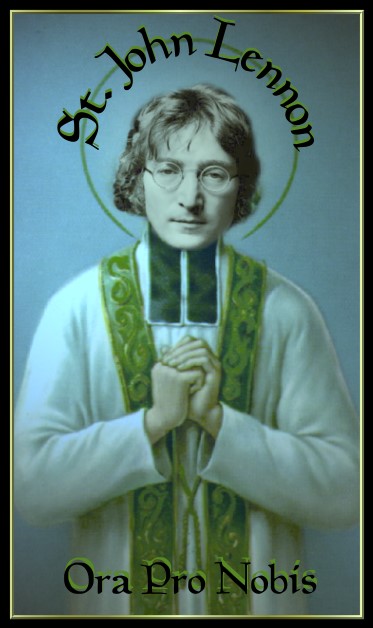 That’d be John, not Vladimir. (Yes, I know, and it’s Lennon, not Lenin.) And “forgive” would be the hedder on the Reuters version of the story about L’Osservatore Romano’s remarkable appreciation of The Beatles on the 40th anniversary of The White Album.
That’d be John, not Vladimir. (Yes, I know, and it’s Lennon, not Lenin.) And “forgive” would be the hedder on the Reuters version of the story about L’Osservatore Romano’s remarkable appreciation of The Beatles on the 40th anniversary of The White Album.
It was John who, in 1966 and at the height of the group’s fame, told a London newspaper, “We’re more popular than Jesus now.” Many were furious, of course–who wasn’t in those days, which are so much like our own. But as the AP version has it, the Vatican’s “official” daily was philosophical about the rocker’s claim:
“The remark by John Lennon, which triggered deep indignation mainly in the United States, after many years sounds only like a ‘boast’ by a young working-class Englishman faced with unexpected success, after growing up in the legend of Elvis and rock and roll.”
Lennon was also joking, displaying the kind of irreverent irony that was shocking then but which would become the foundation of much of modern discourse, and comedy.
Perhaps the bigger question is whether the article in the pope’s paper will prompt any more brow-furrowing inside and outside Rome over the efforts by its new editor, Giovanni Maria Vian, to make the broadsheet a must-read. A recent article by Vaticanista Sandro Magister details some of the controversies.
Recall that a former archbishop of Milan, Giovanni Battista Montini, lamented that “no one reads it [l’Osservatore] at the coffee bar!” When Montini became Pope Paul VI, he reportedly wondered about including sports coverage. But the paper actually became more boring after Paul, and, ironically, under John Paul II, who had little interest in it. Left to its own devices, the newspaper became the Vatican version of Pravda, listing official activities of the Holy Father and glowing reports of audiences and texts of speeches. And none of it on line.
Pope Paul envisioned a newspaper that “does not seek only to furnish news; it intends to influence thought. It is not enough for it to report events as they happen: it intends to comment on them in order to indicate how they should have happened, or not happened. It does not only conduct a conversation with its readers; it conducts one with the world: it comments, discusses, polemicizes.”
Well, 40 years later, much is finally changing. Then again, l’Osservatore did not include a critique of these lines of Lennon, from 1971, when he was on his own:
Imagine there’s no heaven,
It’s easy if you try,
No hell below us,
Above us only sky,
Imagine all the people
living for today…
Imagine there’s no countries,
It isn’t hard to do,
Nothing to kill or die for,
No religion too,
Imagine all the people
living life in peace…
Check back in 2011.
PS: Extra credit for figuring out which Beatle was Catholic. Over at dotCommonweal, Mollie Wilson O’Reilly has the buzz.
Prayer Card via this site.
